Why Do Pigeons Die Suddenly?
Pigeons can live up to about ten years if we don’t consider any of the life-threatening factors. Still, you’ll find most pigeons dying within 3 to 6 years of their life span.
Even with a decade-long expectancy, why do pigeons die suddenly? Whether in the wild or the city, pigeons have too many things awaiting to kill them every minute, so ten years is a bit of a stretch for these feeble creatures. Then there are diseases.
Even though they’re not the sole cause for an abrupt ending to pigeons’ lives, diseases have a significant role in this, which you’ll get to know more about further below.
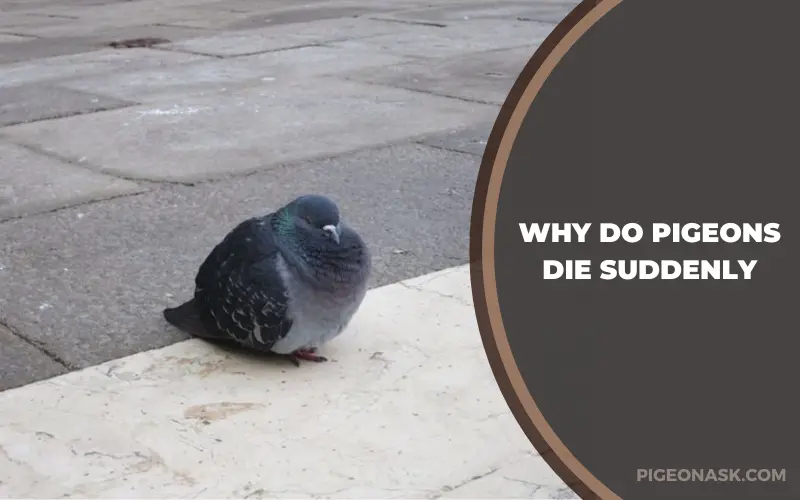
If you want to ensure a long life for the pigeons around you, you have to be aware of all the reasons responsible for their premature expiration.
At least, you should be able to tell when the bird at risk of dying is, and this is what we’re here to talk to you about.
Want to know more about pigeon blogs:
What Is the Most Common Cause of Pigeon Death?
The most common cause of pigeon death is diseases. They catch diseases and infections more rapidly than other animals.
This is such a common phenomenon that pigeons are categorized as zoonotic birds due to their biological tendency to pick up diseases and spread them across other birds and humans.
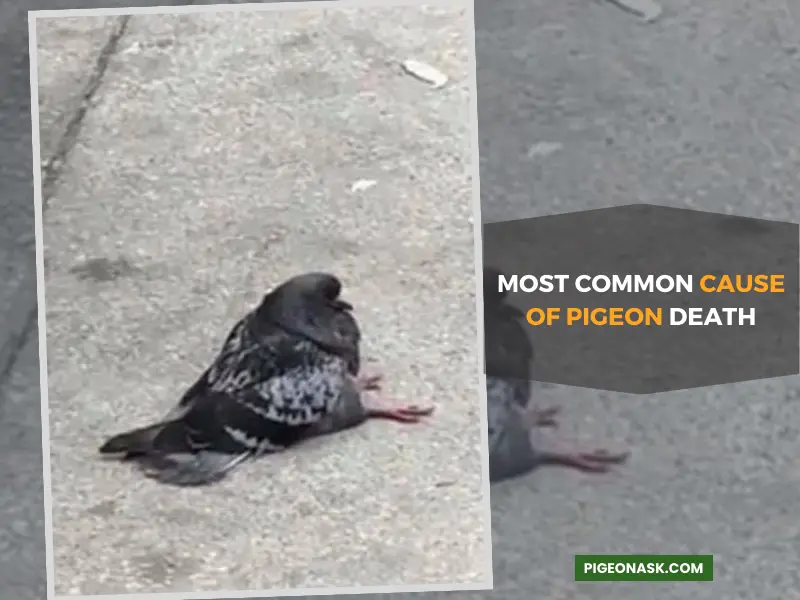
Their immune system reaches its peak when they have grown out of their squab phase. As pigeons get older, age starts to take a toll on the immune and digestive systems, making them vulnerable to germs and diseases. And in most cases, that ends with a sudden death.
What Are the Other Common Causes of Pigeon Death?
Apart from diseases, there are several other common causes that kill pigeons sooner. It can be either an attack by a cat or them getting hit by a car. Let’s take a further look at the other common causes below –
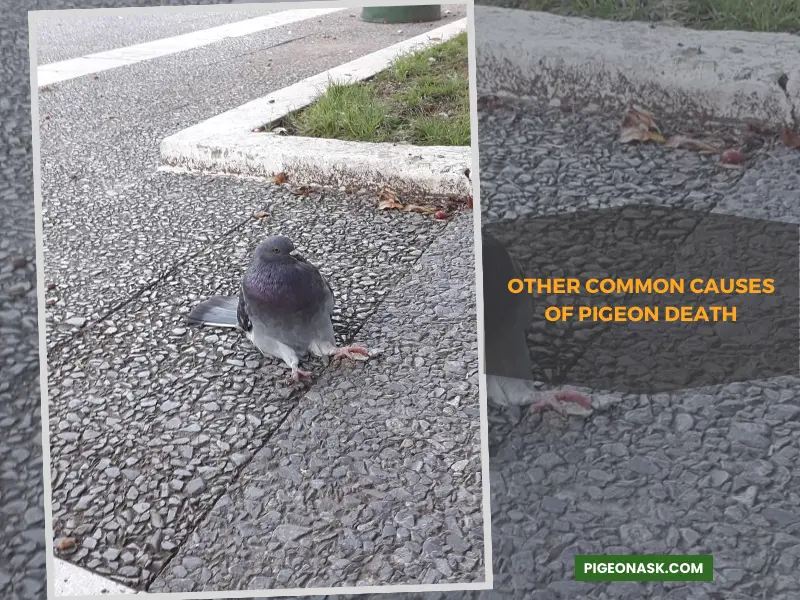
Animal Attack
Pigeons are always at a high risk of being killed by predatory animals. On the ground, it’s either cats, dogs, or snakes, and then there are hawks, eagles, and owls eyeing them for a fresh hunt.
This is even more of a common cause for death for the squabs, as they’re too little to understand the threats of predators, and for the old ones, as they’re too weak to protect themselves.
Accidental Injuries
Pigeons are smart for birds, but not so much for being able to separate mere reflection from real sight. They often mistake mirrors, glasses, and windows for open doorways and hit their heads while flying at a faster pace.
Sometimes, these bumps can lead to fatal injuries. In cities, there are broken glass, uneven stone surfaces, rusty metal, and barbed wire fences that can cut them at places severely.
And then there are electric shocks induced by the wires, cables, and poles, and because of the lightning strikes, they’re not safe in the wild either.
Allergies
Allergic reactions caused by food or pollens might seem harmless for most parts, but you never know what a pigeon can or can’t handle.
Even if the organic ones don’t do much harm, allergies caused by chemical products can be pretty deadly for the pigeons. Some products emit fumes that are pretty hazardous to their respiratory system.
Poison Induced Reaction
Pigeons can die by eating plants that are poisonous to their digestive system. Toxins in some plants can cause extreme diarrhea, breathing problems, renal failure, and even heart failure.
Plus, pigeons may devour pesticides while eating crops and vegetables, and pesticide poisoning is one of the leading causes of pigeon death in the wild.
Apart from plants and crops, pigeons often fall victim to lead poisoning. Structures with oxidizing metals and sulfates in unpurified form around these birds are another fatal source of poison-induced lethal reactions for them.
Trauma and Shock
These birds are not as strong in the heart as bigger animals. Fear of predators and unexpected events can send them to instant shock, which can kill them as a result.
Apart from that, excessive stress in pigeons often results in weakness and organ failure, ending in sudden death.
These are the common causes responsible for a pigeon’s reduced lifespan. Death by disease certainly takes the crown because it’s the hardest to deal with.
If you want to reduce the chances of sudden death of pigeons around you, you should at least be well aware of all the diseases that may put the pigeons at risk.
What Diseases Affect Pigeons?
As a zoonotic bird, pigeons are likely to be affected by almost all sorts of avian diseases out there. Sometimes, they fall sick from worm or parasitic attacks, and then there are several variants of bacterial infection.
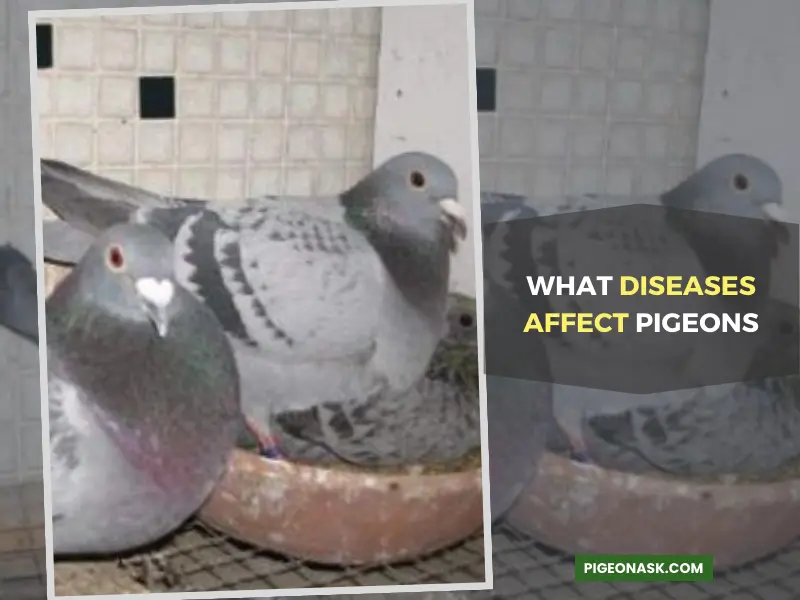
The common diseases affecting pigeons can be narrowed down to the following ones –
Parasitic Worms
Invertebrates like Gapeworms, Hairworms, Roundworms, and Tapeworms live inside the pigeon and feed on the body or the nutrient elements.
Pigeons can be infected by worms by living around worm-infested droppings and eating insects or worm-infested food.
When affected by worms, pigeons become super weak within a short period, fail to perform regular activities with ease, and in the worst cases, have excessive diarrhea.
Hexamitiasis
It’s a parasitic disease caused by a protozoan variant found mostly in feces but can get mixed in drinking water and food as well.
The microorganisms responsible for this get inside the digestion system and cause pigeons to lose feathers and become too weak to function properly.
Hexamitiasis isn’t deadly for most parts. But when the intestinal regions are affected, pigeons start vomiting profusely and have excessive diarrhea. It’s difficult for the bird to recover when the diarrhea is too bloody and watery.
Canker
The official name of the disease is Trichomoniasis, as a parasite named Trichomonas Gallinae is responsible for it, but it’s more known as the canker disease. This parasite can spread through a pigeon or drinking water.
The parasite resides in the digestive system or near the mouth. Its key symptoms are unhealthy feathers, loss of appetite, and weight loss. As you can assume from the symptoms, death is not uncommon in this disease.
Coccidiosis
This disease is also caused by a parasite variant living inside the digestive system. The parasites can get inside the body through already-infected pellets or feces.
It meddles with the digestive system heavily, making the bird lose its appetite or be unable to process the food properly. Diarrhea is one of the extreme symptoms, but death by diarrhea is pretty rare in this disease.
External Parasitic Diseases
Apart from microorganisms meddling inside the body, external parasites like mites and lice can have a terrible effect on pigeons. Sometimes, they introduce other diseases to the bird’s system, other times they do all the harm by themselves.
Unhealthy feathers, scaly skin texture, rash, and blood loss are instant results of mite or lice infestation.
Colibacillosis
It is a complicated disease by nature as it’s caused by already existing viral or bacterial diseases inside the pigeon’s system. It gets inside the bird through air, food, drinking water, or feces. The symptoms are swollen limbs and a weak immune system.
Mycoplasmosis
One of the leading bacterial variants. It affects the respiratory system, causing the pigeon to have flu-like symptoms. The bird can get infected with mycoplasmosis through drinking water, food, or feces.
Sometimes, even the loft they live in can be responsible for this. Breathing issues, throat inflammation, and nasal discharges are common indications of Mycoplasmosis.
Necrotic Enteritis
This is another bacterial disease that gets into the pigeon’s system almost anywhere.
Clostridium perfringens, the bacteria responsible for the disease, thrive on the ground, in the loft, inside drinking water, food, and feces. The usual symptoms can range from unhealthy feathers to diarrhea and a weak immune system.
One thing common about the diseases mentioned above is they’re not deadly if you take accurate measures in time. Especially, it’s easier to cure the bacterial ones with proper medication.
Are There Any Specific Diseases that Can Cause Pigeons to Die Suddenly?
Apart from the ones mentioned in previous sections, there are certain diseases that will kill pigeons in an instant if not treated immediately. Mostly, it’s the bacterial ones that tend to be of this nature.
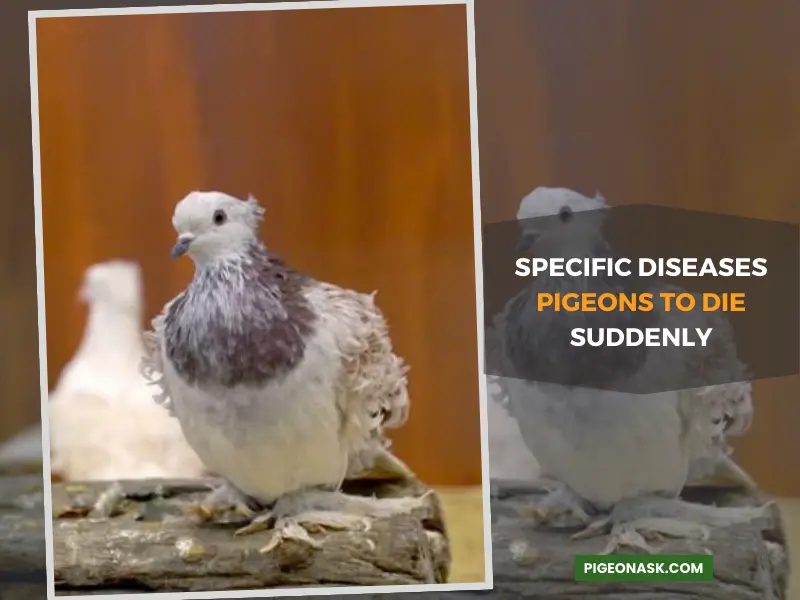
The diseases with larger and sudden mortality rates are discussed below –
Salmonellosis
This is an infection of zoonotic nature. The bacterium of Salmonellosis gets inside the pigeon’s system through drinking water, food, or infected feces.
It can affect any part of the pigeons, causing them to project versatile symptoms not related to each other.
Flying issues, weakness, faltering movements, loss of appetite, and diarrhea are some of the prominent symptoms. Pigeons have a tendency to die from Salmonellosis if not treated immediately.
Parrot Fever
Despite being labeled as a parakeet disease, Parrot Fever doesn’t discriminate.
Officially known as Ornithosis, this disease spreads widely through the air. Urine and fecal matter are secondary careers for this bacterial variant.
It’s a prime zoonotic disease that can easily be transmitted to humans. When one pigeon is affected in the loft, it doesn’t take much time for the others to get affected as well.
The key symptoms range from breathing issues, nasal discharge, heavy fever, and appetite loss to unhealthy feathers, shedding, and intestinal issues like inflammation and diarrhea to the extent of sudden death.
E. coli
One of the deadliest diseases for pigeons, given how it affects the immune system.
The E. coli bacteria weakens their immune system and is receptive to the attack of other viral and bacterial diseases. So, the pigeons fall super sick within a short time and fail to recover on their own, which contributes to increasing mortality rate.
E. coli bacteria is usually found in drinking water or feed. Besides, having too many pigeons in a compact space, unclean lofts, and excessive stress can often lead to the spread of E. coli in a group.
It’s not like there are no effective treatments for these diseases. They’re curable with immediate actions. But neglecting the symptoms or not taking the instant necessary measures will always end tragically for the pigeons.
What Can I Do to Prevent Sudden Death in Pigeons?
Since you now know very well what causes sudden death in pigeons, it shouldn’t be hard for you to take the necessary steps to prevent sudden death in pigeons.
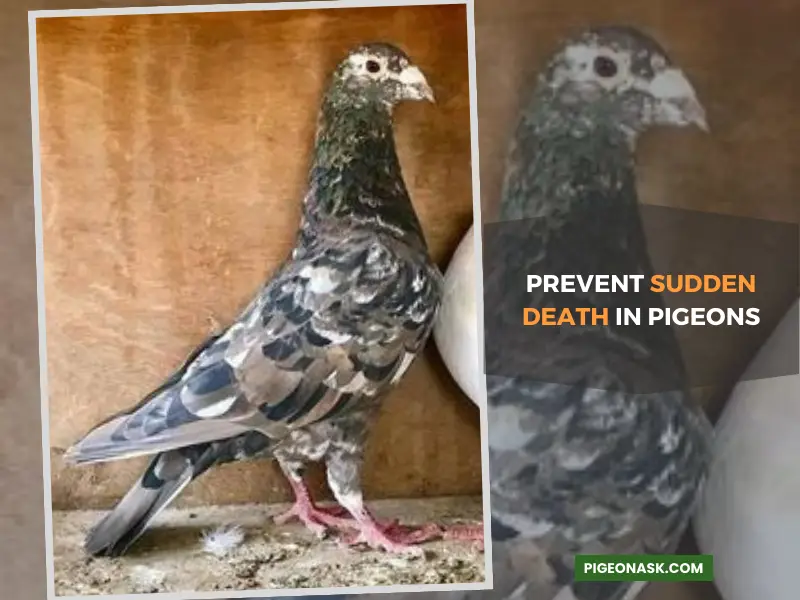
It’s a challenge for them to survive in the wild or city for more than five years, but domestic pigeons live longer for a reason. As a kind human being or an owner of pigeons, you can do your part in the following ways –
Clean Food and Water
Lots of times, pigeons get sick from consuming infected, bacteria-ridden food or water. Always give them fresh food to avoid certain parasitic or bacterial variants.
Check the expiry date and condition of feeds and pellets before putting them in front of the birds. Regularly change the drinking water to keep the birds from coming in touch with various diseases.
Tidy Loft
If you look at the way most diseases get into the pigeon’s system, it’s often through fecal matter or infested loft.
So, keep the loft clean all the time to keep the parasites or bacteria from infesting anything around the bird. Use disinfectants to keep the loft mite or lice-free.
Immediate Treatment
Doesn’t matter if they have tiny or major symptoms, take them to the vet anytime you notice something even remotely suspicious. Sometimes, the pigeons die only because they weren’t treated immediately after falling sick.
And when one bird is sick, keep it secluded from other birds to keep the disease from spreading.
Safe Environment
In the wild or in the city, most pigeons’ lives are cut short by predatory attacks.
Keep their lofts protected from both the enemies in the sky (eagles, hawks, owls) and on the ground (cats, raccoons, badgers, dogs, coyotes, foxes, snakes) to keep them from getting attacked.
Make the lofts high enough to keep them out of touch with anything on the ground and cover enough to keep others from prying inside.
Stress-Free Life
Just like us humans, pigeons need a stress-free life for a prolonged life span. Which can easily be achieved through the steps mentioned above.
Pigeons are less likely to be stressed or worked up when they’re not threatened by predators, not shocked by external events, or have enough space for themselves.
Final Takeaway
With proper attention and all this stuff in check, you’ll be able to keep the pigeons alive for more years than their general lifestyle allows.
Although it’s hard for them to survive, given why do pigeons die suddenly, it doesn’t have to be as tragic for your birds. Who knows, with all the right steps, you might be able to keep them alive for more than a decade!
These tips go for protecting wild or feral ones as well. For more future updates on pigeons, follow us on Facebook, Twitter, and Google News.
